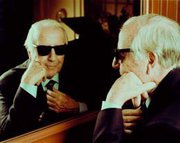 Today’s Wall Street Journal “Sightings” column is a tribute to George Shearing. Here’s an excerpt.
Today’s Wall Street Journal “Sightings” column is a tribute to George Shearing. Here’s an excerpt.
* * *
George Shearing, who died on Monday, was a great jazz pianist. For much of his long lifetime, he was also one of the 20th century’s most successful entertainers, a purveyor of super-smooth easy-listening music that was distinguishable from Muzak only because he played it with perfect taste. That was part of what made him so admirable an artist: Even when he was making music for the masses, he did it without a hint of condescension.
Mr. Shearing, who was born in England in 1919, started out as a standard-issue swing-era piano player. Then he moved to the U.S. in 1947, heard what the boppers were doing on 52nd Street, and decided to do likewise. Blessed with an ear sharp enough to hear a gnat shrug, he easily mastered bop’s complex vocabulary, but decided that it was too abrasive to give pleasure to ordinary listeners. In 1949 he put together a quintet with an offbeat instrumentation–piano, vibraphone, guitar, bass and drums–that played everything from pretty-pretty ballads to such hell-for-leather bebop anthems as Denzil Best’s “Move.” He kept the textures light and the solos concise, and the public, not surprisingly, loved what it heard. “September in the Rain,” the quintet’s first single, sold nearly a million copies….
Mr. Shearing’s willingness to work both sides of the street vexed jazz critics, who are not an especially tolerant lot, and by the ’60s he had been written off as a popularizer. In fact, though, he was something completely different, a dead-serious artist who enjoyed playing well-crafted music that was accessible to a popular audience. One of my favorite Shearing records is a quintet-plus-strings performance of “Early Autumn” from a 1961 album called, believe it or not, “Satin Affair.” Yes, it’s elevator music–but if you don’t respond to its elegance, then you’re not paying attention….
* * *
Read the whole thing here.
Terry Teachout on the arts in New York City
An ArtsJournal Blog
